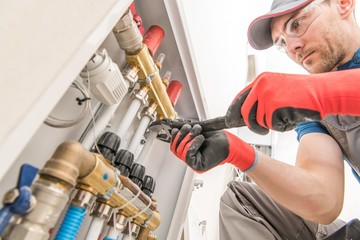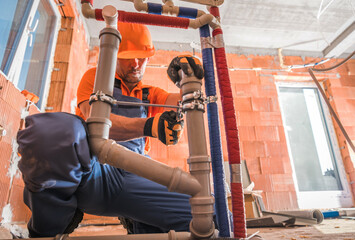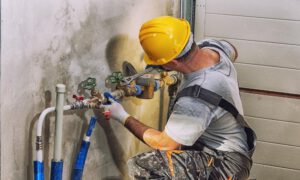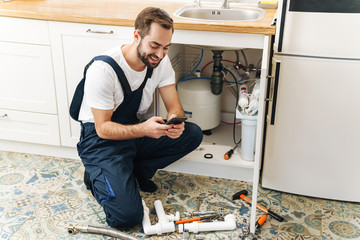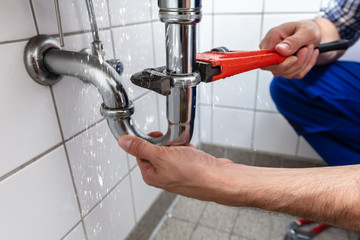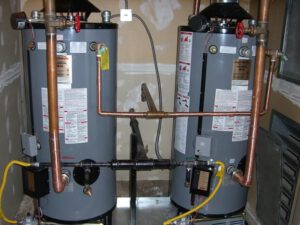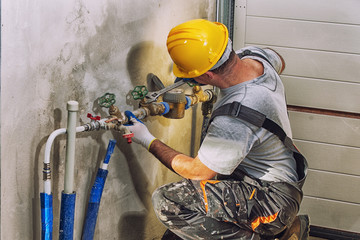Plumbers install and repair pipes to transport water, gas, sewage, and other fluids. They also remove waste from homes and businesses.
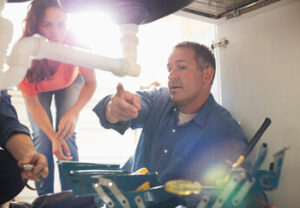
They must be physically strong and capable of working in cramped spaces. They must also have excellent coordination skills.
Plumbers install and repair pipes that supply water and gas to, as well as carry waste away from, homes and businesses. They also maintain plumbing fixtures and appliances, including toilets, bathtubs, and sinks.
They may also be called upon to design and construct plumbing systems. They draft blueprints, perform diagnostics, and ensure that plumbing systems are in compliance with regulatory codes.
A typical plumber’s job begins with mapping out a new plumbing system, which includes determining the size of the pipes and deciding where to place them and where to connect them. Then, they open up the underground path that will be used for the expansion and install piping and seals.
After installing the piping and connecting it to the house’s water supply, the plumber must make sure that all of the drain lines are in place. Once all of this is done, they can move on to the installation of plumbing fixtures and appliances.
In this phase of the installation process, they need to cut drywall and lift tiles in order to expose a path for the pipes. They should also carefully check that everything is connected and seals are firm.
Once the plumbing system is complete, they will need to test the water pressure and make sure that the system is functioning properly. They will use a tool called a pressure gauge to check the water level in the piping system.
They will also check that all the pipes are sized correctly and do not need to be replaced or repaired in the future. They should never use smaller pipes than they can handle, as this will result in clogged drainage and poor system efficiency.
They will then need to run the new piping and set up connections for all of the available toilets, showers, and bathtubs in the home. They should also take care to install the appliances in the proper location and seal them with grout. Lastly, they will need to turn on the water to make sure that everything is working. If they detect any leaks, they will fix them as quickly as possible.
Plumbers offer repair services for a variety of plumbing systems and appliances. They can fix anything from a leaking pipe to a toilet that won’t flush. They also repair fixtures such as sinks and bathtubs.
Residential plumbers work primarily with pipes and water systems within homes. They may perform smaller plumbing jobs, such as a leak in the kitchen sink, or larger projects, like installing an entire new bathroom system. They also provide customer service, such as answering questions and providing recommendations.
Commercial plumbers focus on plumbing issues in businesses. They are responsible for removing waste and maintaining the plumbing systems in large buildings. These responsibilities are often more complex than those of residential plumbers, which can make repairs take longer and require more communication with building owners.
They are also more likely to risk infection when working with sewage systems since they are dealing with human waste and bacteria. This can lead to illnesses like cholera, typhoid, and hepatitis.
The most common plumbing repairs that plumbers are called to handle are clogs and leaks. A clog can be caused by many things, such as food particles, paper products, hair, or dirt. It can be difficult to remove, especially if it’s stuck very far in the pipes or if it’s very old. Similarly, a leak can be the result of something as simple as a tree root that has moved into the sewer line and is causing problems.
Most clogs and leaks can be fixed at home, but some need to be addressed by a professional. When a professional takes care of clogs, they will typically use a powerful, high-pressure water blast to get rid of them. This will not only eliminate the problem but also clean out the pipes.
Another common issue that plumbers deal with is a broken or corroded sewer or water line. This can be caused by a tree root that has broken through the ground or an aging sewer line. These issues need to be repaired or replaced immediately to prevent serious damage to your home and the pipes that transport the water to it.


